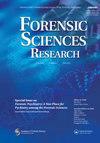Children’s outcomes in road traffic accidents: challenges for personal injury assessment
IF 1.8
4区 医学
Q3 MEDICINE, LEGAL
引用次数: 0
Abstract
Abstract Children represent a specific group of road traffic accident (RTA) victims. Performing a personal injury assessment (PIA) for a child presents a significant challenge, especially when assessing permanent disabilities and needs. However, medico-legal recommendations for PIA in such cases are lacking. The main objective of this study was to analyse the differences between children and a young- and middle-aged adult population of RTA victims to contribute to the development of relevant guidelines. Secondary objectives were to identify and characterise specifics of children’s posttraumatic damages regarding: (a) temporary and permanent outcomes; and (b) medico-legal damage parameters in the Portuguese context. We performed a retrospective study of RTA victims by comparing two groups (n = 114 each) matched for acute injury severity (SD = 0.01): G1 (children) and G2 (young- and middle-aged adults). Logistic regression was used to estimate the odds ratios. G1 presented a greater chance of evolving without or with less severe body, functional and situational outcomes (three-dimensional assessment methodology) and with lower permanent functional disability values than G2. Our findings suggest that childhood trauma generally has a better prognosis than trauma in young and middle-aged adults. This study generated evidence on the subject and highlighted the most significant difficulties encountered by medico-legal experts when performing PIA for children.儿童在道路交通事故中的后果:人身伤害评估的挑战
儿童是道路交通事故受害者的一个特殊群体。对儿童进行人身伤害评估(PIA)是一项重大挑战,特别是在评估永久性残疾和需求时。然而,在这种情况下,缺乏关于PIA的医学法律建议。本研究的主要目的是分析儿童和青壮年RTA受害者之间的差异,以便为相关指南的制定做出贡献。次要目标是确定和描述儿童创伤后损害的具体情况,包括:(a)暂时和永久的后果;(b)葡萄牙情况下的医疗-法律损害参数。我们对RTA受害者进行了回顾性研究,比较了两组(n = 114)急性损伤严重程度(SD = 0.01)相匹配的患者:G1(儿童)和G2(青壮年)。采用Logistic回归估计比值比。G1表现出更大的进化机会,没有或不太严重的身体、功能和情境结果(三维评估方法),永久性功能残疾值低于G2。我们的研究结果表明,儿童创伤通常比青壮年创伤预后更好。这项研究产生了关于这一主题的证据,并强调了医学法律专家在为儿童实施PIA时遇到的最重大困难。
本文章由计算机程序翻译,如有差异,请以英文原文为准。
求助全文
约1分钟内获得全文
求助全文

 求助内容:
求助内容: 应助结果提醒方式:
应助结果提醒方式:


